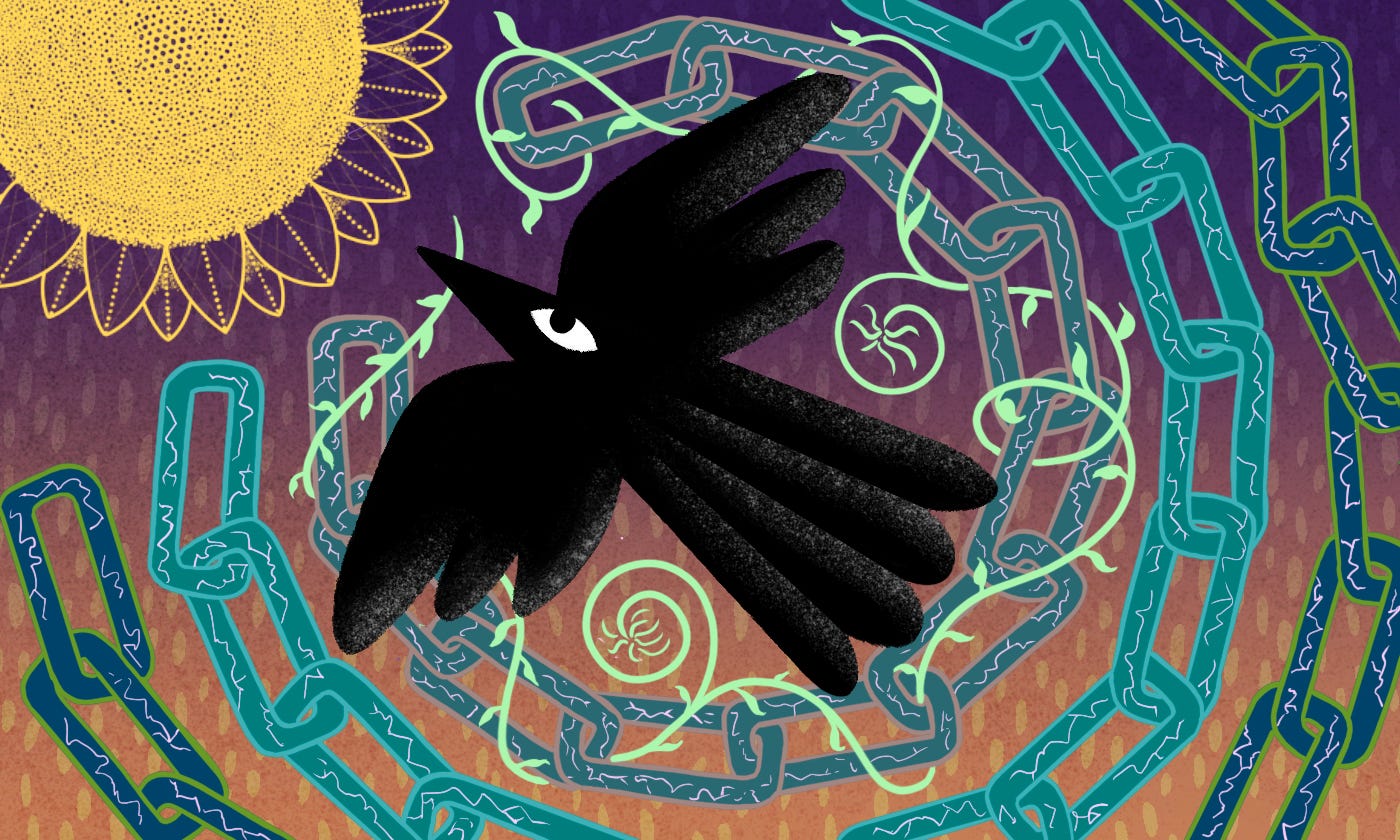How do we abolish the 'woke' cop in our head?
On cancel culture, the social media rage machine & echo chambers
How can we hold people accountable in ways that we would like to be held accountable? How can we as communities practice justice in a way that doesn’t replicate the same cycles of violence that have been killing us thus far? What if accountability wasn’t scary? What if accountability was a sacred opportunity for us all to practice liberation?
In the last few years, partly due to social media’s ever-expanding reach, we’ve seen many call outs, take downs of ‘problematic’ people, grievances or harm being addressed in the public sphere in various ways. Some of this may be necessary due to extreme power imbalances with elite, wealthy perpetrators where there is no real mechanism of accountability because hierarchical systems are designed that way- billionaires, celebrities, politicians, state elite etc. But in this 2-part series, I want to focus on cancel culture (a broad elusive subjective term) or punitive culture— which I define as harm, conflict or misunderstandings among regular, working class people (like you & me) being addressed with carceral measures & punishment framed as ‘accountability’. I think it is critical we distinguish between the Harvey Weinsteins & regular folks who may commit harm which includes working class people who happen to have a niche social media platform.
When someone is deemed to have done something that is not in alignment with our values or perceived as offensive or harmful, we publicly shame, humiliate & rip them to shreds until the next ‘problematic’ person comes along or the sensational gossip wave has passed. I’m not above this. I’m learning everyday to dismantle the carceral instincts that have been drilled into me. This is a life long commitment & daily practice.
I have on occasion naively & reductively participated in spreading unvetted, dubious, damning info about a neoliberal influencer or felt good about being “better than” people who have been accused of messing up. Except, we all mess up. Of course, I’ve messed up & will continue to. I’m human & I’m engaging in relationships. Conflict is inevitable which is why we must learn & practice navigating it with compassionate accountability. We’re also all capable of any type of harm given the right conditions. We all commit harm and all harm is contextual. I accept these complexities to give myself & others the grace to make mistakes & not be defined by our worst ones. So is it ever okay to cancel someone?
Punishment & exile are not justice just like prisons & police are not justice. Actions motivated by self righteous hatred, vengeful contempt, revenge, envy etc when directed at each other will not enable healing or justice in the grand sense— it will not save us, keep us safe, meet our basic needs, cultivate reciprocity, transform our communities sustainably or heal our collective wounds. “The master’s tools will never dismantle the master’s house”. Policing, punishing & caging each other will not be practices that liberate us. But I understand how messy this all can be given that we are currently transitioning towards a better world.
For paid subscribers ~~~
I will illustrate some key points in this 2-part series with two examples— PART I will have some of my personal reflections from the debacles I’ve faced in the last 2 years of having an online ‘platform’. In PART II I will share some unfiltered reflections about a recent call out situation on IG that I came across after many people tagged me in posts or DM’ed me. I think this situation illustrated a lot of frequently recurring problems with social media call outs & can be a learning moment for us all. Some reflection questions & transformative justice resources listed at the bottom!
Side note: I highly recommend watching the film Farha on Netflix.
Farha is one of the first films presented to western audiences that tells the story of the Palestinian Nakba, which means catastrophe in Arabic. In 1948, colonizing Zionist militias violently kicked out over 75% of the Palestinian population from their homes and decimated over 700 villages in order to create Israel- a settler colonial empire- on on stolen Indigenous Palestinian land. This created the largest refugee population in the world that till this day do not have the right to return to their homes. The film is based on a true story told through the eyes of a 14-year-old Palestinian girl named Farha who witnesses the massacres through a small window of the room she is hiding in. The Zionist regime & its supporters are aggressively targeting the film including bullying, harassing & cancel campaigns against the people behind the film to try to de-platform it from Netflix & get it banned. Watch it with your loved ones/ community.
Digital capitalism drives a culture of disposability
Most of us spend a large portion of our lives online. For many, social media & online platforms are the sole source of information on world events. In an exceedingly lonely society where we spend majority of our lives in school, at work, doing state mandated chores, burn out or recovering from exhaustion- social media has become a dominant coping tool to blow some steam. Often, the internet is what people turn to to soothe themselves, feel something (anything), seek connection or approval, garner validation, affirm current beliefs/ actions/ pursuits, feel stimulated or get a hit of novelty after a monotonous boring work day, feel like they belong to something that is bigger than themselves, and feel like they matter. This is not meant to be condescending- all living beings need community, connection & validation to survive. Digital capitalism takes advantage of these basic needs & exploits them.
Beyond being validated, we also need to be pushed, challenged, supported as we learn to work through discomfort. We need real, authentic, genuine, reciprocal relationships beyond fleeting virtual contacts or para-social online relationships to grow, evolve & thrive. Social media by default does not allow for these complexities, depths, & nuances because it was designed to promote reductions & binaries of good/ bad, right/ wrong, positive/ negative, yes/no etc.
P.S. in Part II, I’ll add some much needed dark humor with an “All the people or groups that ever tried to cancel me” section & point out some common patterns & fallacies between seemingly different groups across the political spectrum— it’s not a particular group of people or identity, its capitalism & the individualism that defines our culture.
Our rising dependence on virtual platforms, apps, search engines & social media has led to a parallel rise in polarization, echo chambers & cancel culture. These state deployed tools divide the working class so we can be easier to conquer. You can read more about how digital platforms control & shape our identities in Part I and Part II of the Surveillance Capitalism series by
& I. We're doing a deeper dive into case studies & examples soon!Note: My writing is generally more direct, not sugar-coated, & more unfiltered than people may like. I don’t want to overly police my tone, rhetoric, grammar or lingo anymore in constant fear of how I may be misjudged, misinterpreted, misunderstood, misquoted, or mistaken. I don’t want to force myself to fit western rules on what is considered polite, positive or respectable. This is a complex topic many folks work & write extensively on. I’ve written on it before. We will continue to build on these foundations eternally. I will not cover every nuance or reference everything on the topic. We do this because no one is free until we are all free. So take a deep breath with me & read on with all the compassion, complexity & curiosity you can muster within you.
Some key points that are necessary to give this topic complexity:
Prisons, police, violent state tools (imperial military, borders etc) are the original forms of cancel culture rooted in colonialism/ capitalism. Oppressive systems are upheld and maintained by cultures of oppression which we are all coerced to participate in since the day we were born. No one is above the b**ls**t. Decolonization is a daily practice we must all to commit to that paves the path for the liberation of all peoples. No one is free until we are all free.
There are varying levels of harm. Differentiating between types of violence, harm, conflict or misunderstandings and their resulting impact is critical because the way we respond, manage & handle them should be equally nuanced on a case-by-case basis. If we truly care to address harm to prevent it, then we must focus on what actually facilitates transformation & repair. Some different levels of harm or perceived harm that may occur among regular people are: (for brevity I’m not addressing state sanctioned violence or harm from people in powerful, wealthy, elite)
Direct violence, abuse, sexual assault, targeted harassment
Prolonged direct emotional abuse or manipulation, indirect or enabled violence in terms of lack of support/ complicity/ inaction
Mutual disagreements, conflicts, disputes
Miscommunication, misunderstandings, misinterpretation
Perceived, subjective harm: This particular aspect often goes unaddressed & is actively bred & enabled by digital capitalism. I define this as an act or a person being perceived as harmful by someone (based on their subjective, often reductive assessment) when there is no clear, substantive evidence (as in it is not perceived as harmful by others including people with the same marginalized identities as the accuser). This can include offense taken due to differing opinions or beliefs.
Conflict is important. It can be regenerative with the right community conditions.
Keep reading with a 7-day free trial
Subscribe to Cosmic Anarchy to keep reading this post and get 7 days of free access to the full post archives.










